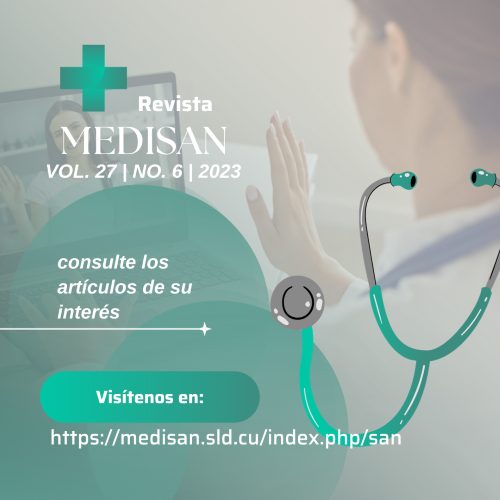Training process of the medical student in the detection of post-COVID-19 incapacitating sequelae
Keywords:
clinical diagnosis, post-COVID-19 syndrome, medical student.Abstract
Introduction: In the continuous training process of medical students, it is necessary to incorporate current issues; likewise, it is important to know the problems to seek solutions with the science support.
Objective: To diagnose the training process of medical students as for the detection of incapacitating sequelae post-COVID-19.
Methods: An observational, descriptive and cross-sectional study, with qualitative approach, of 20 students from 5th year of Medicine career, belonging to the University of Medical Sciences in Camagüey was carried out during their stay for the Public Health subject, from July to December, 2022. For such a purpose it was designed and applied an evaluative instrument with dimensions and indicators.
Results: It was found that 50.0% of these students were in the age range of 21-26 years, while 65.0% were female. The cognitive dimension was evaluated as bad because 3 indicators, of the 4 that made it up, received that qualification; the same happened with the instrumental dimension. On the other hand, the attitudinal dimension and its 2 indicators were qualified as good.
Conclusions: Inadequacies existed in the training process of medical students, which block their professional performance. On the base of the diagnosis, the interest in searching for information related to the detection of post-COVID-19 incapacitating sequelae is confirmed as strength.
Downloads
References
2. Álvarez Sintes R. Plan de estudio de medicina: ¿nueva generación? Rev Habanera Cienc Méd. 2017 [citado 01/08/2023];16(5). Disponible en http://www.scielo.sld.cu/scielo.php?script=sci_arttext&pid=S1729-519X2017000500001&Ing=es&tlng=es
3. Caballero González JE. Análisis del perfil del egresado de la carrera de Medicina en la Universidad Médica Cubana. Educ Med Super. 2000 [citado 01/08/2023];14(1). Disponible en: http://www.scielo.sld.cu/scielo.php?script=sci_arttext&pid=S0864-21412000000100002&Ing=es&tlng=es
4. Villares López A, Rubio García P. El estudiante de Medicina: Un ficus en formación. RIECS. 2018 [citado 01/08/2023];3(1). Disponible en: https://www.riecs.es/index.php/riecs/article/view/69/117
5. Fernández Sacasas JA. El principio rector de la Educación Médica cubana. Un reconocimiento a la doctrina pedagógica planteada por el profesor Ilizástigui Dupuy. Educ Med Super. 2013 [citado 01/08/2023];27(2). Disponible en: http://scielo.sld.cu/scielo.php?script=sci_arttext&pid=S0864-21412013000200011&Ing=es
6. Álvarez Escobar MdC. Formación del profesional de la salud: una mirada reflexiva. Rev Méd Electrón. 2017 [citado 01/08/2023];39(4). Disponible en: http://scielo.sld.cu/scielo.php?script=sci_arttext&pid=S1684-18242017000400015&Ing=es&tIng=es
7. Molina Raad V. Caracterización del componente estudiantil en la pesquisa activa relacionada con la COVID-19. Rev Electrón. "Dr. Zoilo E. Marinello Vidaurreta". 2020 [citado 01/08/2023];45(3):e2260. Disponible en: http://revzoilomarinello.sld.cu/index.php/zmv/article/view/2260/pdf_681
8. Silva Velasco E, López Aballe M, Odou Cobian JR. Procedimientos didácticos y organizativos para la formación clínica de los estudiantes de Medicina. Luz. 2023 [citado 01/08/2023];22(1). Disponible en: http://scielo.sld.cu/scielo.php?script=sci_arttext&pid=S1814-151X2023000100004&lng=es&nrm=iso&tlng=es
9. Rodríguez Carrasco BB, Alonso Cordero ME, Báez González A, Martínez Rodríguez V. Conocimientos de la población de un consultorio médico sobre la COVID-19. Medimay. 2021 [citado 01/08/2023];28(1):83-93. Disponible en: https://revcmhabana.sld.cu/index.php/rcmh/article/view/1946/pdf_301
10. Rodríguez Puga R. Secuelas discapacitantes poscovid-19 en pacientes pediátricos desde el enfoque del especialista en Higiene y Epidemiología. Archivos del Hospital Universitario “General Calixto García”. 2023 [citado 01/08/2023];11(1). Disponible en: https://revcalixto.sld.cu/index.php/ahcg/article/view/e1063/863
11. World Medical Association. World Medical Association Declaration of Helsinki. Ethical Principles for Medical Research. Involving Human Subjects. JAMA. 2013 [citado 10/06/2023];310(20):2191-4. Disponible en: https://www.wma.net/wp-content/uploads/2016/11/DoH-Oct2013-JAMA.pdf
12. Olano Tito O, Calvo Díaz M, López Aguilera AF, Molina Nápoles LI. Conocimientos sobre la COVID-19 en estudiantes de Medicina. IV Convención Internacional Cuba Salud. 2022 [citado 01/08/2023]. Disponible en: https://convencionsalud.sld.cu/index.php/convencionsalud22/2022/paper/download/2688/1224
13. Miralles Aguilera EA, Taureaux Díaz N, Fernández Sacasas JA, Pernas Gómez M, Sierra Figueredo S, Diego Cobelo JM. Cronología de los mapas curriculares en la carrera de Medicina. Educ Med Super. 2015 [citado 01/08/2023];29(1). Disponible en: https://ems.sld.cu/index.php/ems/article/view/443/231
14. Proenza Hernández L, Gallardo Sánchez Y, Figueredo Remón RJ. Caracterización del comportamiento académico en estudiantes de Medicina frente a la pesquisa de la COVID-19. Multimed (Bayamo). 2020 [citado 01/08/2023];24(3). Disponible en: https://revmultimed.sld.cu/index.php/mtm/article/view/1949/1954
15. Medina Fuentes G, Carbajales León EB, Carbajales León AI. Intervención educativa sobre la COVID-19 en los estudiantes de Medicina. Policlínico ¨Joaquín de Agüero¨. Medimay. 2020 [citado 01/08/2023];27(3):366-76. Disponible en: https://revcmhabana.sld.cu/index.php/rcmh/article/view/1758/pdf_273
16. Careaga Valido D, Gil Figueroa BV, González García X, Gómez Pimentel Y, Valle González D. Conocimientos sobre prevención y control de la COVID-19 en estudiantes. Rev Cienc Méd Pinar Río. 2020 [citado 01/08/2023];24(6). Disponible en: http://scielo.sld.cu/scielo.php?script=sci_arttext&pid=S1561-31942020000600005&Ing=es
17. Mejia CR, Rodríguez Alarcón JF, Carbajal M, Sifuentes Rosales J, Campos Urbina AM, Charri JC, et al. Validación de una escala breve para la medición de conocimientos básicos acerca del coronavirus, Perú (KNOW-P-COVID-19). Kasmera. 2020 [citado 01/08/2023];48(1). Disponible en: https://www.redalyc.org/journal/3730/373064123009/html/
18. Vargas Capará FD, Pinedo I, Villalba C, Gerometta R. Conocimientos de vías de transmisión, medidas de prevención y actitudes sobre COVID-19 en estudiantes de Medicina de la Universidad Nacional del Nordeste. Rev Fac Med Hum. 2020 [citado 01/08/2023];20(4). Disponible en: http://www.scielo.org.pe/scielo.php?script=sci_arttext&pid=S2308-05312020000400589
19. González García S, Casadelvalle Pérez I, Urda Bordoy MO, Yedra Díaz A, Fortum Sampayo T, Mezquia de Pedro N. La COVID-19 y la formación científica de los estudiantes de Medicina. Rev Cuban Invest Bioméd. 2021 [citado 01/08/2023];40(1):e943. Disponible en: https://revibiomedica.sld.cu/index.php/ibi/article/view/943/863
20. Machado Machado Y, Paz González SA, Ramírez Oves I, García Ortiz Y, Cruz Martín O, Santiesteban Pineda DM. Acciones educativas para estudiantes de ciencias médicas vinculados a la pesquisa durante la COVID-19. Edumecentro. 2022 [citado 01/08/2023];14. Disponible en: http://scielo.sld.cu/scielo.php?script=sci_arttext&pid=S2077-28742022000100042&Ing=es
Published
How to Cite
Issue
Section
License
All the articles can be downloaded or read for free. The journal does not charge any amount of money to the authors for the reception, edition or the publication of the articles, making the whole process completely free. Medisan has no embargo period and it is published under the license of Creative Commons, International Non Commercial Recognition 4.0, which authorizes the copy, reproduction and the total or partial distribution of the articles in any format or platform, with the conditions of citing the source of information and not to be used for profitable purposes.





